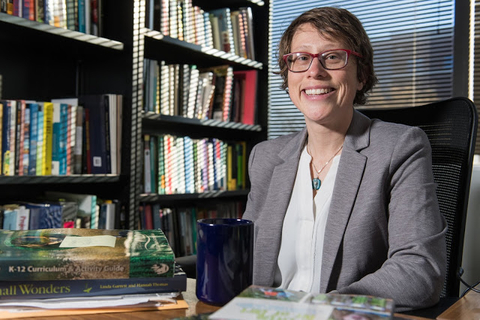1. Make a difference now and in the future.
You’ve seen the headlines about climate change, the extinction crisis, the fact that plastic residues are showing up in our blood stream and in the most remote corners of the world – and you want to know more and do more. An ENS degree will help you understand these complex issues, explain them to others, and decide what happens next.
2. You are a hands-on learner.
As an ENS student, you will have the chance to get involved right away in scientific research, policy design, volunteer opportunities, and internships that will help you put your knowledge into action. You can build bird boxes to help endangered species, work in our organic on-campus garden, tag salamanders to help understand species population dynamics, design hands-on environmental education lessons for fourth graders, help implement sustainability projects on campus, use drones to study invasive species, intern with a non-profit focused on Illinois environmental policy, create maps using GIS – the sky is the limit. We will work with you to help you get the real-world experience that you need to use your degree to make a difference.
If you enroll in our on-campus MS program, you can fund your education and get two years of professional experience working for a state agency by joining the Graduate Public Service Internship Program (GPSI). Although most GPSI positions are in Springfield, if you are located in Chicago, you can also pursue our online MS and apply for one of the new Chicago-based internships. This incredible combination of the ENS MS degree and real-world professional experience works like a charm on the post-graduation job market, and who doesn’t love avoiding student loans?
3. You want great career opportunities.
An interdisciplinary ENS degree will prepare you to understand environmental issues from a scientific, social, and policy perspective. This is a winning combination that will prepare you to be flexible in a changing job market. You could work for a public agency like the Environmental Protection Agency, the Department of Natural Resources, or your local county or city government. Our alumni in these jobs conduct research, interpret and enforce environmental regulations, and run environmental programs of all kinds. You could also work for a small or large company ensuring that the business follows all appropriate environmental regulations, designing ways for operations to be more sustainable, or conducting the research necessary to comply with environmental law. Our alumni work for companies like Subaru, Valvoline, and Archer Daniels Midland (ADM), ensuring that these businesses are at the cutting edge of environmental performance and sustainability. You could also work for a non-profit organization advocating for stronger environmental policies or providing great programs that make your community more ecologically and socially resilient. Your degree will give you the skills to succeed in any of these roles.
4. Learn from expert faculty who want to help you succeed.
Our ENS faculty conduct research globally and are experts in their fields. We love teaching at UIS because of the small class sizes and the opportunity to really get-to-know and mentor our students. Whether you complete your degree on-campus or online, you will get to know us well, and we will help connect you to research, teaching, service, and career opportunities.
5. You want to meet other students
As an ENS student, you will be part of a community of learners (on-ground and online), all of whom are passionately interested in environmental issues. Your fellow students will introduce you to new ideas, share their unique insights and experiences with you, and learn from the knowledge and perspectives that you share in return. You will build a rich set of personal and professional connections that will last a lifetime, and together you will change the world. We are counting on it.
If you are ready to declare an undergraduate Environmental Studies major or minor or you are interested in pursuing an MS in Environmental Science or our graduate GIS certificate, reach out today. Our departmental email is ens@uis.edu. For questions about the undergraduate degree or minor, you can also contact Andrew Nicol, our undergraduate adviser, at anico2@uis.edu. If you have questions about our graduate programs (online and on-ground), contact Abby Walden at awald3@uis.edu. More information can also be found on our UIS ENS website. We are looking forward to hearing from you!

Dr. Megan Styles received her Ph.D. in Environmental Anthropology from the University of Washington in 2011. She also holds an M.A. in Anthropology and a B.A. in Anthropology and Environmental Studies. Megan’s research focuses on sustainable agricultural development, environmental justice, and conservation issues in East Africa and the United States. She is the author of Roses from Kenya: Labor, Environment, and the Global Trade in Cut Flowers, an ethnographic examination of the social and ecological effects of cut flower farming near Kenya’s Lake Naivasha.